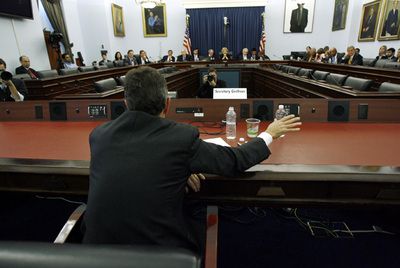Minnesota officials today said the unemployment rate rose to 7.6 percent in October, while 2,200 jobs were added. As with most economic stories, this one, too, is long on numbers and short on English.
Treasury Secretary Tim Geithner is one of the few people in Washington who speaks English when it comes to testifying before Senate and House committees. He’s also one of the few cabinet members who appears to have little stomach for the niceties of politics.
So today’s Geithner testimony before the Joint Economic Committee held a lot of potential for fireworks. It includes Senate and House members with similar dispositions. It did not disappoint.
Republicans came out looking for blood, and Geithner was more than happy to oblige. It was not only great theater, the two sides provided a clear picture of where two economic philosophies collide.
Take this exchange between Geithner and Rep. Michael Burgess (R-TX):
Burgess: TARP (the bailout) is supposed to expire. Why won’t we let it die a natural death rather than letting it painfully linger?
Geithner: We are looking to put the TARP out of its misery, and nobody will be happier than I am to see that program terminated and unwound. I want to point out that we are moving very aggressively to close down and terminate the programs that defined TARP at the beginning of the crisis.
Burgess: It looks like the money is going out with little or no oversight.
Geithner: That is absolutely not true. The Congress established three separate oversight committees…
Burgess: Your own inspector general on the Troubled Asset Relief Program has got several concerns. Why not just stop spending on the TARP funds and why not repeal the program? We don’t need it anymore. People never liked it, let’s just do away with it… If you just get the heck out of the way, the American economy will recover, as it has always done.
Geithner: That broad philosophy helped produce the worst financial crisis and the worst recession we’ve seen in generations. We had a pretty good test of that philosophy, pretty good test of those policies, it did not serve the country well…
Burgess: When I came here in 2003, we were in a jobless recovery. Tax relief was passed in May 2003 and as a consequence, by July of that year we were adding jobs at a significant rate. It seems to have worked fairly well. I don’t think you should be fired, I thought you should never have been hired. And I objected when the hearings were going on over in the Senate; I thought there were too many question marks about things that had occurred in the past, and it did not leave the American people with a good feeling about the person who was going to be responsible for this economic recovery. What can you say today… I’ll tell you my folks, they’re not just anxious, they are mad; they are fighting mad about what is happening in the economy. They are fighting mad about the stimulus. They are fighting mad about how many jobs we created in Arizona’s 9th District, do you know the congressman in Arizona’s 9th District? They won’t have a 9th District until after redistricting; they only have 8 right now. This kind of nonsense is what the American people are seeing and that’s why they’re so upset. (Bob notes: See my post here on the mystery districts)
A few moments later, the committee chair asked about the gap between the “haves” and “have-nots” in America.
“We’ve had a decade-long increase in inequality in America; it did not start in this decade,” Geithner replied. “It really started a long time ago. But in the ’90s, we had a long period with budget surpluses, rapid growth in private investment, rapid growth in productivity across the American economy, with broad-based gains in income for middle-class Americans. That record should make one optimistic about this country, and what’s possible if we get the basic policies right. But you can see from the state of this economy, looking back just a year ago, what happens when you get those broad judgments wrong. It’s unfair and unjust because the people who bear most of the burden of those crises are the people who are the most vulnerable.”
A few minutes earlier, Geithner sparred with another Texas Republican congressman:
Minnesota Sen. Amy Klobuchar ran the latter part of the hearing but had little to offer. But, then again, what was left to say?

